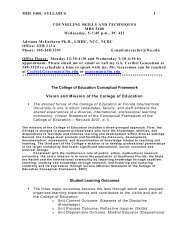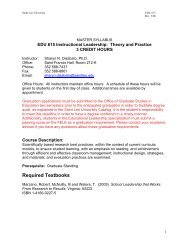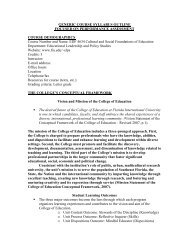2007 - College of Education - Florida International University
2007 - College of Education - Florida International University
2007 - College of Education - Florida International University
You also want an ePaper? Increase the reach of your titles
YUMPU automatically turns print PDFs into web optimized ePapers that Google loves.
An Individualist Strategy in a Collectivist Society<br />
The African communal view <strong>of</strong> self contrasts sharply with the dominant view <strong>of</strong> self in<br />
Western thought. Social development in the African context is not an individual journey; it is a<br />
process whereby “a person realizes his or her place and responsibilities within a community <strong>of</strong><br />
other people” (Mkhize, 2006, p. 187). The Batswana philosophy states that “the individual is<br />
meaningful only as a part <strong>of</strong> the whole society, since to be is to participate” (Otunga, 2005, p. 50)<br />
illustrating a belief inherent in collectivist societies where the concept <strong>of</strong> self is interdependent<br />
(Gudykunst et al., 1996). Due to the collectivist nature <strong>of</strong> Botswana, “participatory methods <strong>of</strong><br />
planning and delivery <strong>of</strong> prevention activities” should be used (Ntseane, 2004, p. 20).<br />
In reference to the current state <strong>of</strong> HIV/AIDS education in Botswana, Preece and Ntseane<br />
(2004) found that “an education strategy that privileges the individual sits uneasily within a<br />
culture that responds more willingly to collective pressure to conform and take responsibility for<br />
others” (p. 18). The ABC message privileges the individual’s right to change his or her behavior<br />
from the established social norms without the permission or agreement <strong>of</strong> the community (Heald,<br />
2002). For example, for a man to decide to be faithful to one wife in a polygamist community, he<br />
would have to reject the norm <strong>of</strong> having multiple sexual partners.<br />
In collectivist societies such us those in Botswana, cultural norms are accepted and not<br />
challenged by community members (Triandis et al., 1988). It is against their nature to disregard<br />
the needs <strong>of</strong> the community or “do their own thing” (Triandis et al., 1988, p. 325). The cultural<br />
norms <strong>of</strong> the Batswana are such that individuals feel pressure to conform to behaviors that are<br />
strictly opposite those purposed by the ABC campaign. For instance, women are told to oblige<br />
partners to wear condoms when traditionally men have total control over sexual situations.<br />
In addition, the campaign makes no attempt to appeal to the Batswana’s shared sense <strong>of</strong><br />
responsibility by placing emphasis on changing behavior for the benefit <strong>of</strong> the group (Preece &<br />
Ntseane, 2004). While the rationale and delivery <strong>of</strong> the ABC campaign conflict with the cultural<br />
norms <strong>of</strong> Botswana’s collectivist society, each component <strong>of</strong> the campaign also conflicts with<br />
Batswana sex norms.<br />
Social and Sexual Norms <strong>of</strong> Behavior<br />
The production <strong>of</strong> children is expected, making abstinence a dissenting act, and marriage<br />
is primarily a union for producing children (Ntseane, 2004). If a husband believes he is impotent,<br />
he may “place his wife at the disposal <strong>of</strong> an intimate friend or relative to have a child” (Ntseane,<br />
2004, p. 11). “Similarly, if the problem lies with her, she may procure another woman from the<br />
family to bare him children, thus saving the marriage” (Ntseane, 2004, p. 11). In Botswana,<br />
although sex has many other purposes, such as for pleasure or exchange, procreation is a sexual<br />
priority (Ntseane, 2004). Condoms, which act not only as a barrier for sexually transmitted<br />
diseases, but also for procreation, have been “actively opposed by church groups, parents, and<br />
elders” for being seen as promoting immorality and promiscuity (Allen & Heald, 2004, p. 1144).<br />
The social norms governing sex acts with cousins, uncles, stepfathers, and boyfriends<br />
have a direct bearing on the be faithful to one partner component <strong>of</strong> the ABC campaign (Ntseane<br />
& Preece, 2005). For example, the polygamous ideal still prevails in many ethnic groups in<br />
Botswana as evidenced by sexual practices like Nkazana, which is sex between husband and the<br />
wife’s younger sister, and Seantlo, which is a marriage between a widow or widower and a<br />
sibling <strong>of</strong> the deceased husband or wife (Ntseane, 2004). The social functions <strong>of</strong> sex within these<br />
groups are likely to engage individuals in sex with multiple partners, thus negating the possibility<br />
<strong>of</strong> being faithful to one partner (Ntseane, 2004).<br />
9
















